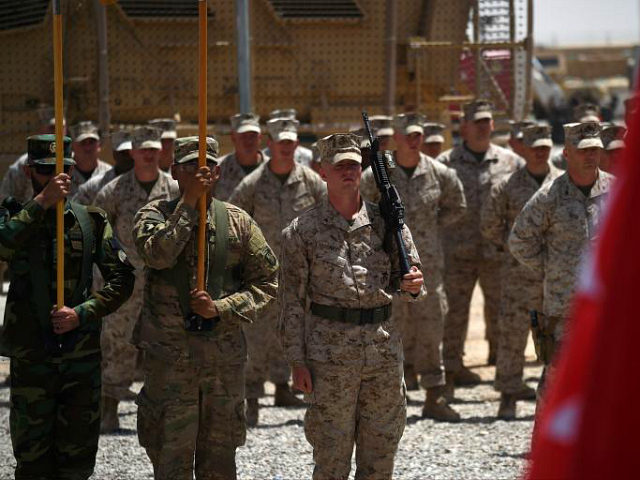The U.S. is reportedly deploying dozens of additional Marines to join an estimated 300 others in southern Afghanistan’s Helmand province, an opium-rich Taliban hotspot located along the Pakistan border.
Citing anonymous U.S. defense officials, NBC News reports, “Task Force Southwest, based in Helmand Province in southwestern Afghanistan, requested the additional Marines to help with internal force protection. … There are currently more than 300 Marines assigned to Task Force Southwest, and the total additional force is less than 100 marines.”
NBC News acknowledges that a spokesperson for Marine Corps Forces Central Command (CENTCOM) refused to confirm the deployment, saying, “The repositioning and movement of forces in the CENTCOM [area of responsibility], to include presently deployed Marines, happen at the discretion of the CENTCOM Commander.”
A defense official told NBC News that under President Donald Trump, “the commander on the ground has the authority to move people in theater around.”
U.S. Central Command, or CENTCOM, is charged with overseeing American military operations in the Middle East and Afghanistan. Gen. Joseph Votel, the chief of CENTCOM, reportedly approved the request for additional forces.
The unnamed defense officials noted that the new deployment has nothing to do with President Donald Trump’s long-awaited Afghanistan strategy, but instead fulfills a request from a commander on the ground, identified as Marine Brig. Gen. Roger Turner.
NBC News notes that the additional Marine force has not yet been moved into Helmand province.
“The officials would not say where the marines would deploy from specifically, with one saying, ‘we are redirecting them from where they’re at now to help with the mission,’” explains the news outlet.
According to the latest United Nations data on opium cultivation in Afghanistan, Helmand is the country’s top poppy plant-producing region. Opium is the main ingredient in heroin.
The Taliban generates most of its funding from the illicit opium business in Afghanistan, the world’s top opium and heroin supplier.
Helmand also sits next to Kandahar province, the birthplace of the Taliban. Both provinces have long been considered one of the most violent regions in war-ravaged Afghanistan.
In its latest quarterly report to Congress, the Special Inspector General for Afghanistan Reconstruction (SIGAR), revealed that the Taliban controls most of Helmand, the largest province in Afghanistan.
SIGAR’s findings echo various other assessments, including one by the Long War Journal which determined that the Taliban controls (7) or contests (6) nearly all of the 14 districts in Helmand.
By May of this year, the deployment of nearly 300 U.S. Marines, approved by the previous administration, had moved into Helmand.
The additional American service members marked the return of the U.S. Marines to a province that had mostly fallen back into the hands of the Taliban after the Marines spilled significant blood to liberate it from the terrorist group.
Although the Marines were sent to southern Afghanistan to train, advise, and assist the Afghan National Defense and Security Forces (ANDSF), their mission may change under Trump.
The Marines’ advise-and-assist mission could provide the ANDSF “the support they need to reverse the momentum of the Taliban in that important province that sits astride the critical ‘Ring Road’ that connects the southern and western parts of the country to Kabul,” retired Gen. David Petraeus, who served as the top commander of U.S. and NATO troops in Afghanistan between 2010 to 2011, told Marine Corps Times, in April.

COMMENTS
Please let us know if you're having issues with commenting.